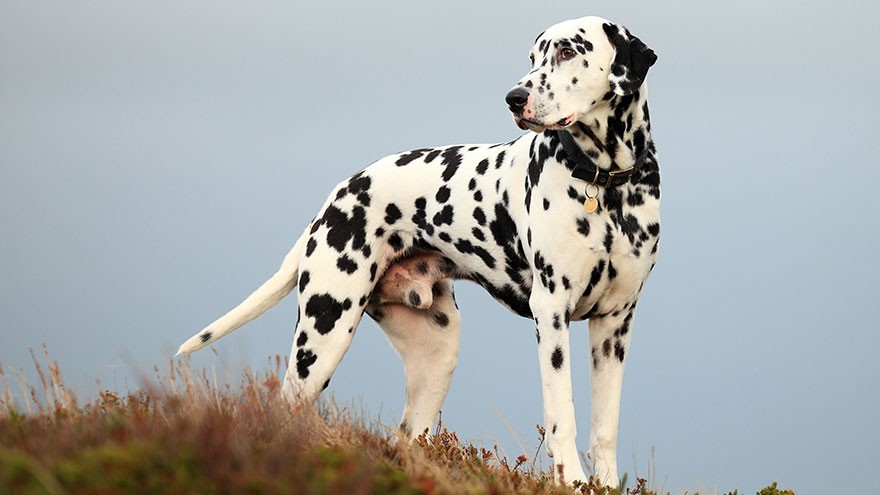Dalmatian : 10 Most Common Questions
The Dalmatian is a popular family pet for good reason. The breed’s natural friendliness and playfulness have put this dog near the top of the list as a pet choice for many years. With the correct planning and some basic training, most Dalmatian owners have had a wonderful experience with their dog.
To help you in your search for the perfect Dalmatian we have gathered 10 common questions and provided answers to each.

1. What is the history and background of the Dalmatian?
The history of the breed is still a matter of controversy to many people. The Dalmatian is believed to have originated from a region on the Adriatic Sea called Dalmatia. Recent research ties the breed to the area of Croatia.
The breed’s history includes use as guard dogs, circus and stage performance, and herding. It has been known as a coach dog for many years and is shown on wagons, other horse-drawn vehicles, and of course, fire trucks, which were originally drawn by horses.
2. What special jobs or purpose does the Dalmatian have?
It is interesting to note that the breed has always had a naturally liking for horses and for being around horses. In the past, the Dalmatian was known to trot alongside horses, in front of horses and even under horse drawn wagons.
There are also reports of Dalmatians running along with horse drawn fire wagons and keeping the horses calm and in line while the firefighters were working. Dalmatians can make good watchdogs and are protective of their owner and family.
3. How big can I expect my Dalmatian to get?
Dalmatians have the lean lines of a pointer and will be 20 to 24 inches tall and weigh up to 55 pounds, making them a mid-size dog with stamina and a sturdy build.
Because of their energy and natural playfulness, this breed does not usually gain extra weight.
4. What about the interesting, spotted coat of the Dalmatian?
Puppies are born white and the spots develop over the first months of the dog’s life. Most Dalmatians have black or deep brown spots.
Dogs with “liver” colored spots are rare but not necessarily more expensive or valuable. Spots are generally from dime size to half-dollar size.
5. I see Dalmatians in pet stores a lot. Is this a good place to buy them?
Most dog owners with experience will tell you that it is best to buy from a top-quality breeder, one that is reputable. The best breeders will never supply retail stores with puppies and only sell the dogs directly to you.
One of the drawbacks of buying at a store is that you do not have all the background information you need about the dog’s health and personality. By visiting several breeders, you will be able to judge a puppy based on its parents and on the way the breeder handles his dogs.
6. What health problems should I be aware of with Dalmatians?
When it comes to Dalmatians, two major things should be considered pertaining to health. About 10% of Dalmatians are born deaf, so working with a breeder and veterinarian who know about the BAER test is highly recommended. This can help you avoid getting a young dog that has serious hearing problems.
In addition, Dalmatians tend to have problems with urinary problems such as kidney stones if they do not get the correct diet and plenty of fresh water. This is due to high uric acid content in urine. Low protein diets can help with this. Ask your breeder and veterinarian about the few other health problems with Dalmatians, which tend to be very healthy dogs.
7. Do Dalmatians do well with children?
Usually, the Dalmatian is a breed that does very well with young children, though their size and quickness can be a problem with very young children.
If the breeder has properly socialized the puppies to be comfortable with humans, the Dalmatian should not give you problems around your family. In fact, with the right limits, it can be good to encourage your children and Dalmatian to run and play together.
8. What about taking my Dalmatian out for walks and to the park, are other dogs a problem?
Generally, Dalmatians interact well with other dogs, though some males can be aggressive toward other males.
The Dalmatian has a naturally friendly personality and a good breeder who made sure that his puppies were comfortable with other dogs in their early days can help with this. Basic obedience training can be good as well.
9. Will my Dalmatian do well in our small house?
The size of the house is not too much of a problem, though Dalmatians are not good dogs for people who live in apartments. What is most important is that the Dalmatian has a nice size yard to run in and that the owners take the pet to the park.
Remember that this breed is energetic, active dogs and will suffer from being closed in or left without exercise.
10. What are some things I should know about having a grown Dalmatian in my family?
Pertaining to Dalmatians, some key things need to be considered to make life enjoyable. For instance, Dalmatians are territorial but should be friendly, and playful if properly bred and Dalmatians left alone for too long can become bored and destructive.
Dalmatians may not be the best choice for very busy families that do not have time for the pet. In addition, you want to feed your Dalmatian premium food or fresh foods you prepare and make sure the Dalmatian is part of your family.
Read More About Dalmatian
- Dalmatian Breed Information
- Dalmatian Training Guide
- Dalmatian Health Guide
- Owning a Dalmatian : Breeder Recommendations

